Transferts monétaires et mobilité humaine
Les transferts monétaires sont souvent utilisés lors de crises afin de répondre aux besoins des personnes migrantes. Dans cette page, vous trouverez des ressources sur les transferts monétaires et la migration.

La Croix-Rouge se prépare à fournir une aide humanitaire aux migrant·es de la caravane sur le point de quitter le Honduras pour le Guatemala.
©Johannes Chinchilla / FICR.
Conflits, crises économiques et catastrophes sont autant de raisons ayant contraint des personnes à fuir et à traverser des frontières dans des conditions éprouvantes et risquées, en quête de sécurité et de moyens de subsistance. En 2020, le nombre de personnes déplacées de force s’est envolé au niveau sans précédent de plus de 80 millions de personnes, soit près du double du nombre enregistré il y a une dizaine d’année. Cette tendance s’aggrave et les effets du changement climatique menacent de déplacer jusqu’à 200 millions de personnes d’ici 2050.
L’assistance monétaire est de plus en plus utilisée afin de répondre aux besoins des personnes en situation de déplacement. On y a eu recours à grande échelle dans différents contextes de migration, en Europe en 2015 jusqu’au Venezuela pour « los caminantes ». Elle a également été utilisée dans d’autres crises migratoires, notamment en Amérique centrale, au Sahel, en Méditerranée et dans la Corne de l’Afrique. L’assistance monétaire est à l’heure actuelle l’une des principales formes d’aide apportée aux populations déplacées en Ukraine et dans les pays voisins.
Il existe une myriade de perspectives et de définitions concernant le mot « migrant·e » et la façon dont les humanitaires doivent agir. C’est pourquoi nous ne choisissons pas une définition unique pour le moment, étant donné que les discussions sur l’assistance monétaire et la migration en sont encore à leurs prémices et que le langage évolue encore.
Documenter et partager les données probantes donnera lieu à des interventions plus efficaces. Cette page contient une sélection de ressources utiles concernant la migration et le recours à l’assistance monétaire. Elle sera mise à jour au fil des discussions ayant lieu dans les espaces humanitaires des transferts monétaires.
Priorités actuelles
Afin de contribuer aux progrès relatifs à cet enjeu, nous nous engageons à :
- soutenir la création de données probantes aux niveaux régional et mondial ;
- contribuer aux solutions pratiques visant à mettre en œuvre les transferts monétaires auprès des personnes migrantes ;
- organiser des discussions sur les enjeux majeurs basées sur des données probantes.
Contenu récent

Addressing Customer Due Diligence Obligations to Promote Rohingya Financial Inclusion
Report
This report seeks to demonstrate that viable solutions exist for undocumented refugees, and outlines successful examples in different contexts whereby alternative KYC approaches have been established for refugees. It further demonstrates that by identifying and assessing the risks and concerns around...

The Signal Code: Ethical obligations for humanitarian information activities
Guidelines and Tools
Humanitarians today lack sufficient ethical guidance adapted to the realities of humanitarianism in the information age to responsibly navigate the challenges and realities of the digital age. The Signal Code: Ethical Obligations for Humanitarian Information Activities translates and applies the...
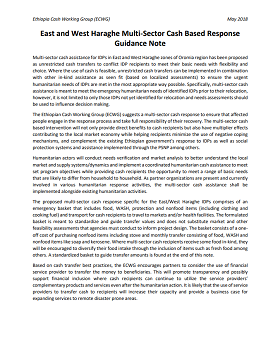
East and West Haraghe Multi-Sector Cash Based Response Guidance Note
Guidelines and Tools
Multi-sector cash assistance for IDPs in East and West Haraghe zones of Oromia region has been proposed as unrestricted cash transfers to conflict IDP recipients to meet their basic needs with flexibility and choice. Where the use of cash is feasible, unrestricted cash transfers can be implemented in...
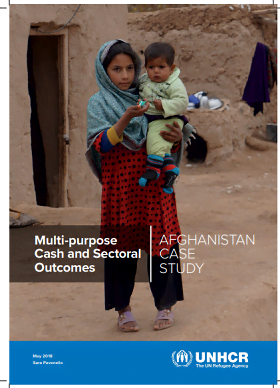
Multi purpose cash and sectoral outcomes – Afghanistan case study
Report
The repatriation cash grant has helped Afghan returnees from Pakistan to meet a number of basic needs upon return. The cash grant is used for transportation costs, to buy food and address important shelter needs, thus contributing to aspects of reintegration. At the same time, poor security of tenure and...

Standard Operating Procedures for Multi-Purpose Cash (MPC) grants
Guidelines and Tools
These Standard Operating Procedures (SOPs) outline the systems, roles and responsibilities, and critical actions for implementing [insert agency]’s Multi-Purpose Cash (MPC) programming on behalf of vulnerable [insert population(s)/groups] in [insert country/region/location].

The Link with National Social Protection Systems: A recap of our Sahel learning event
Blog Post
On April 19th and 20th, the CALP Network and the Regional Platform for Social Protection hosted a learning event exploring how humanitarian cash transfer programmes can work to support national social protection systems in the Sahel.
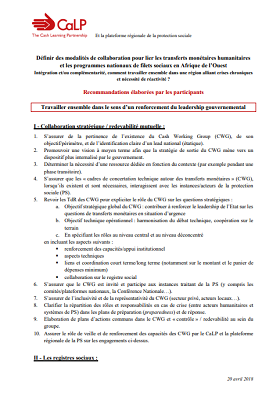
Définir des modalités de collaboration pour lier les transferts monétaires humanitaires et les programmes nationaux de filets sociaux en Afrique de l’Ouest
Rapport
Intégration et/ou complémentarité, comment travailler ensemble dans une région alliant crises chroniques et nécessité de réactivité ?
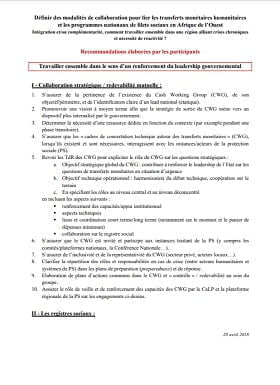
Définir des modalités de collaboration pour lier les transferts monétaires humanitaires et les programmes nationaux de filets sociaux en Afrique de l’Ouest
Guides et outils
Définir des modalités de collaboration pour lier les transferts monétaires humanitaires et les programmes nationaux de filets sociaux en Afrique de l’Ouest Intégration et/ou complémentarité, comment travailler ensemble dans une région alliant crises chroniques et nécessité de réactivité ?

Read our brand new Policy Roundup here
Blog Post
This update was circulated to our policy contacts on 17 April 2018. If you would like to receive these updates via email, please contact stholstrup@cashlearning.org.
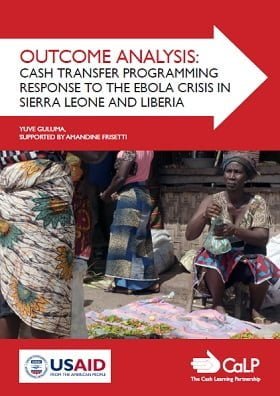
Outcome Analysis: Cash transfer programming response to the Ebola crisis in Sierra Leone and Liberia
Report
The United States Agency for International Development/Food for Peace (USAID/FFP) supported Cash Transfer Programming (CTP) response to the Ebola outbreak in Sierra Leone and Liberia greatly contributed to the recovery of affected communities and households. The CTP response provided a safety net to...

MPG Monitoring Toolkit Development and Guidelines
Guidelines and Tools
This toolkit is designed to serve as a core resource for developing and conducting monitoring of MPG programmes. The tools themselves serve as templates and should be adapted to the local context and objectives of the specific MPG programmes to be monitored. Particular care should be taken to align...
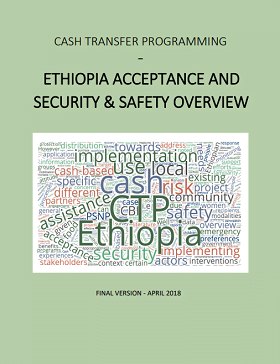
Ethiopia Acceptance And Security And Safety Overview
Report
This overview was created by the Office for the Coordination of Humanitarian Affairs (OCHA) with input by the Ethiopia Cash Working Group (ECWG) and as such is part of the overall effort to create an evidence base of the feasibility and appropriateness to use and scale-up cash transfer programming (CTP)...

Multipurpose Cash Grants (ERC consortium) Standard Operating Procedures (SOPs)
Guidelines and Tools
The purpose of this document is to provide a road map of the essential components when assessing, designing, implementing and monitoring multipurpose cash grant (MPG) programmes. The Assessment and Response Option Analysis and Planning (ROAP) phases encompass the Basic Needs Approach as the key starting...

Emergency Response Capacity (ERC) Consortium – Ethiopia: Building an evidence base on operational models for the delivery of CTP
Report
The Emergency Response Capacity (ERC) Consortium for the Uptake of MPGs is formed by Save the Children, the CALP Network, Danish Refugee Council, Mercy Corps, and OCHA with ECHO financing. Its primary aim is the improvement of capacity, coordination and evidence for multi-purpose cash grants through the...

Help Us to Improve the CALP Network
Blog Post
We need your feedback to help us continue to improve our work. Please spare 10 minutes to complete this survey telling us how we can more effectively help improve the scale and quality of cash transfer programming as a tool for humanitarian assistance. The survey is open until Monday 2nd April 2018....

New Thematic Page on Gender, Protection and CTP
Blog Post
To realise the potential benefits of cash based assistance for everyone, there is need to foster dialogue between cash, gender and protection actors. Actors from different sectors need to work together, share experiences and learning, and address gaps and overlaps. This also requires improving...

Cash Based Assistance PQ Toolbox Now Live!
Blog Post
The CALP Network has developed a programme quality toolbox for cash-based assistance. The toolbox provides a set of common standards and acions for quality CBA. Each action is supported by a set of guidelines and ready to use tools and templates on 'how' to acheive quality CBA. It can be used across CBA...
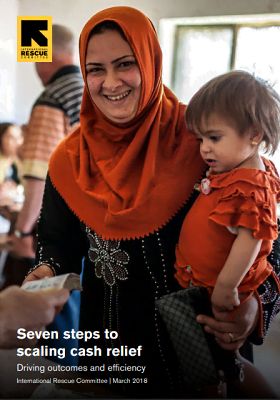
Seven Steps to Scaling Cash Relief: Driving Outcomes and Efficiency
Guidelines and Tools
As we approach the mid-point of our five-year strategy, this briefing explores the way in which the IRC has embraced cash relief programming and is seeking to drive efficiencies and maximise impact. It defines seven steps that the IRC has taken to scale cash relief. It goes on to argue that...
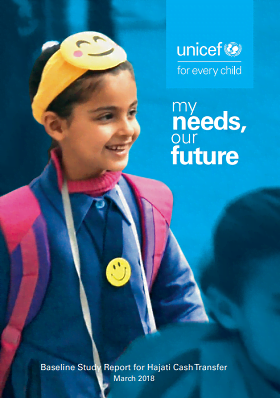
My Needs, Our Future
Report
Since the beginning of the 2017-2018 school year in Jordan, the United Nations Children’s Fund (UNICEF) Child Cash Grant (CCG) launched its new phase, an equity-driven, integrated social protection programme for all children in Jordan called Hajati, or ‘my need’ in Arabic. The new programme built on...
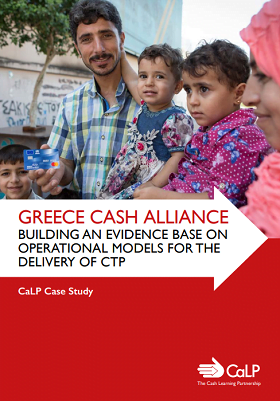
Greece Cash Alliance: Building an Evidence Base on Operational Models for the Delivery Of CTP
Report
The primary aim of this case study is to map out aspects of the Greece Cash Alliance (GCA) operational model influencing key drivers of quality (effectiveness, efficiency and accountability) in the delivery of multipurpose cash grants (MPGs). The GCA was launched in April 2017 with funding from ECHO, in...